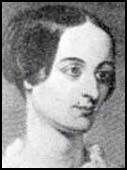Margaret Fuller

Margaret Fuller was born in Cambridgeport, Massachusetts, 23rd May, 1810. Her father was Timothy Fuller, a Republican Party member of Congress. Margaret was educated by her father, before attending the local school when she reached the age of fourteen.
After the death of her father from cholera in October, 1835 she supported her mother and her brothers and sisters by teaching in Boston (1836-37) and Providence (1837-39).
In 1840 Fuller and Ralph Waldo Emerson established the progressive journal, The Dial. For the next two years she edited the journal and in one article, The Great Lawsuit, she called for sexual equality.
In 1844 she published a study of frontier life in Illinois and Wisconsin, Summer on the Lakes. Later that year Fuller was recruited by Horace Greeley to write for the New York Tribune. In the newspaper Fuller wrote about modern literature and advocated social reforms. Greeley later described Fuller as "the most remarkable and in some respects the greatest woman whom America has yet known".
Fuller also wrote feminist tract, Women in the Nineteenth Century (1845). She argued: "We would have every arbitrary barrier thrown down. We would have every path laid open to Woman as freely as to Man. Were this done, and a slight temporary fermentation allowed to subside, we should see crystallizations more pure and of more various beauty. We believe the divine energy would pervade nature to a degree unknown in the history of former ages, and that no discordant collision, but a ravishing harmony of the spheres, would ensue."
The book's theme was that women must fulfill themselves as individuals and not as subordinates to men. She wrote that "when inward and outward freedom for woman as much as for man shall be acknowledged as a right, not yielded as a concession." Fuller's writings on political equality influenced a generation of feminists involved in the struggle for women's suffrage. This included Susan B. Anthony, Elizabeth Cady Stanton, Olympia Brown, Lucretia Mott and Lucy Stone.
In 1846 Fuller became the first American woman to become a foreign correspondent and reported for the New York Tribune from Britain, France and Italy. While in Europe she married the Italian freedom fighter, Angelo Ossoli. Fuller now began advocating socialist views and during the Revolution of 1848 assumed charge of a hospital in Rome while her husband took part in the fighting. The city fell in 1850 and the couple were forced to flee.
In May, 1850, Fuller, Ossoli, and their young son sailed for America. All three died when their ship was wrecked in a storm off New York on 19th July, 1850.
Primary Sources
(1) Margaret Fuller, Women in the Nineteenth Century(1845)
We would have every arbitrary barrier thrown down. We would have every path laid open to Woman as freely as to Man. Were this done, and a slight temporary fermentation allowed to subside, we should see crystallizations more pure and of more various beauty. We believe the divine energy would pervade nature to a degree unknown in the history of former ages, and that no discordant collision, but a ravishing harmony of the spheres, would ensue.
Yet, then and only then will mankind be ripe for this, when inward and outward freedom for Woman as much as for Man shall be acknowledged as a right, not yielded as a concession. As the friend of the Negro assumes that one man cannot by right hold another in bondage, so should the friend of Woman assume that Man cannot by right lay even well meant restrictions on Woman. If the Negro be a soul, if the woman be a soul, apparelled in flesh, to one Master only are they accountable. There is but one law for souls, and, if there is to be an interpreter of it, he must come not as man, or son of man, but as son of God.
Were thought and feeling once so far elevated that Man should esteem himself the brother and friend, but nowise the lord and tutor, of Woman, - were he really bound with her in equal worship, - arrangements as to function and employment would be of no consequence. What woman needs is not as a woman to act or rule, but as a nature to grow, as an intellect to discern, as a soul to live freely and unimpeded, to unfold such powers as were given her when we left our common home. If fewer talents were given her, yet if allowed the free and full employment of these, so that she may render back to the giver his own with usury, she will not complain; nay, I dare to say she will bless and rejoice in her earthly birthplace, her earthly lot.

